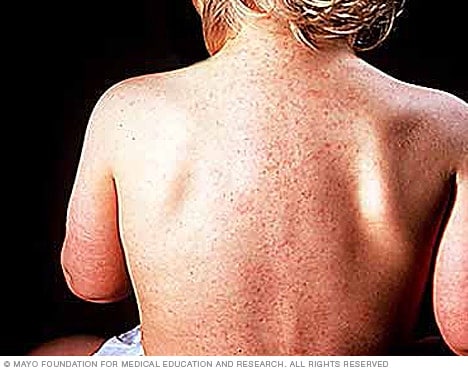Understanding Roseola Rash in Adults: A Comprehensive Guide for Parents
Hey there, all you fabulous moms and dads! Today, we’re diving into a childhood classic that sometimes pops up in grown-ups, too – roseola rash. While commonly associated with the little ones, adults can also be tickled pink (quite literally) by this rashy visitor. Fasten your seatbelts because we’re about to get cozy with all the must-knows about roseola in adults!
What Is Roseola?
Roseola, also known as sixth disease, is typically a child’s game, but occasionally, it waltzes into an adult’s life. It’s caused by two strains of herpes viruses (no, not those famous ones), and while it’s super common in kids, it’s important to clue in on the signs when it affects adults. Knowing is half the battle, right?
Can Adults Get Roseola?
Yes, it’s a resounding YES! Adults can indeed catch roseola, although it’s less common than in children. Immune systems are like fingerprints – everyone’s got a unique one, and some adults might find themselves saying hello to roseola if their immune system nods off. Worry not; we’re here to help you recognize and deal with roseola rash like a pro!
Identifying Roseola Rash in Adults
Pinpointing roseola in adults can be trickier than finding a quiet spot at a toddler’s birthday party. It starts off with a high fever and as the temperature says its goodbyes, a telltale rash usually blankets the body. We’re talking about spots that are slightly raised and a wee bit red, often making themselves at home on the trunk before spreading VIP-style to the limbs.
Symptoms to Watch For:
- Fever: This isn’t your average I-feel-a-bit-under-the-weather situation. It’s a thermometer-busting fever that can last a few days.
- Rash: After the fever breaks, the rash sashays in. It’s generally not itchy or painful, so it’s more of an aesthetic inconvenience.
- Other Symptoms: Sometimes, roseola likes to bring friends in the form of fatigue, swollen glands, and, on rare occasions, a sore throat or runny nose.
How Do Adults Catch Roseola?
You may think that being a grown-up means you’re off the hook for catching childhood illnesses, but viruses don’t discriminate based on age! Roseola is typically passed through respiratory secretions or saliva – think sharing utensils or being on the receiving end of a toddler’s sneeze. It’s not as catchy as the common cold, but being in close quarters with someone who has it can raise your chances of an introduction.
Treatment: Handling Roseola Like a Boss
If roseola does come knocking, don’t stress! It’s usually a mild guest. The focus is on comfort and soothing symptoms since antibiotics won’t show these viruses the door (they’re viral, not bacterial, after all).
Home Remedies to Try:
- Rest: Embrace the excuse to cozy up and catch some Zs!
- Hydration: Keep the water flowing to help your body bounce back.
- Fever Management: Over-the-counter fever reducers are your new BFFs – think acetaminophen or ibuprofen.
Remember to chat with your healthcare provider if any symptoms seem out of the ordinary or especially stubborn. They’re the ultimate sidekick for taming the roseola rash in adults.
Alright, stick with me! We’re going to tie up all the loose ends and make sure you’re armed with the top tips to help your body hurdle over roseola. And always remember, when it comes to health, the best offense is a great defense: stay informed, stay alert, and stay smiling!

Understanding Roseola Rash in Adults: A Comprehensive Guide for Parents
Hello, wonderful parents! We’re on a journey to demystify the pesky, yet not-surprisingly-common roseola rash that can also touch the lives of adults. Though this condition is often a kids-only party, we’re here to guide you through the adult version with cheer and insights!
Spotlight on Roseola
Roseola, affectionately dubbed as the “sixth disease,” is a blast from the past for many, often harkening back to those daycare days. Nevertheless, it’s caused by human herpesvirus 6 (HHV-6) and human herpesvirus 7 (HHV-7), and on the rare occasion, it can dance its way into an adult’s immune system.
Adults vs. Roseola – The Possible Encounter
Take note – adults can, indeed, encounter roseola. It’s an infrequent guest, but those with weakened immune responses could receive an unwanted invite. But fear not; we’re on hand to help you spot and deal with roseola rash in the adult arena.
Pinpointing Roseola Rash in the Grown-up Crowd
Figuring out roseola rash in adults is more art than science. Initially, a high fever kicks things off, and once it takes a bow, a distinctive rash often steals the spotlight. The rash – little red dots, sometimes raised – prefers to begin its visit on the torso before jaunting out to the arms and legs.
Symptoms to Keep on Your Radar:
- Thermometer Tales: This isn’t just feeling slightly feverish. It’s a full-blown fever situation that may stick around for several days.
- The Rash Reveal: As the fever fades, the rash steps up. Typically, it isn’t itchy or painful, just visibly present.
- The Plus-Ones: Accompanying the core symptoms, adults may also experience fatigue, swollen glands, a sore throat, or even a runny nose.
Catching Roseola: How It Happens
Viruses aren’t choosy guests – they don’t care about age. Roseola is usually spread through respiratory droplets or saliva. So, sharing drinks or getting caught in a sneeze spray could increase the odds of meeting roseola head-on.
Treating Roseola: Adults Edition
Roseola in adults doesn’t typically warrant panic. It’s about comfort and symptom management since this is a viral charade – no antibiotics required. Here are a few home remedies worth considering!
At-Home Care Strategies:
- Rest and Relaxation: The perfect excuse for some downtime. Your body needs it to fight off the viral invaders.
- Fluid Power: Hydration is key. Drink plenty of fluids to stay hydrated and help your system recover.
- Fever Patrol: Stock up on fever reducers like acetaminophen or ibuprofen to get that fever in check.
If symptoms start performing off-script or linger longer than a bad movie, get in touch with your healthcare provider. They’ll help you navigate those roseola rapids with finesse.
Don’t hit the pause button just yet! There’s more to cover, ensuring you’re equipped with the best game plan to topple roseola from your adult life. Keep your health playbook up-to-date, stay vigilant, and those smiles will be your best armor.
See more great Things to Do with Kids in New Zealand here. For more information see here
Disclaimer
The articles available via our website provide general information only and we strongly urge readers to exercise caution and conduct their own thorough research and fact-checking. The information presented should not be taken as absolute truth, and, to the maximum extent permitted by law, we will not be held liable for any inaccuracies or errors in the content. It is essential for individuals to independently verify and validate the information before making any decisions or taking any actions based on the articles.




